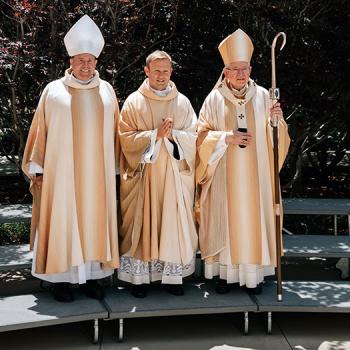Lectionary Reflections
Isaiah 55:1-9
March 3, 2013
I have spent nearly my entire adult life reading and pondering the wonders and mysteries of the Hebrew Bible. Writing that sentence is decidedly peculiar and incredibly amazing, given my non-church upbringing, my complete lack of interest in church until my twenties, and my thorough fascination with literature, especially Shakespeare and 19th-century fiction. That I would find myself immersed in all things Bible is more than surprising; it is little less than astonishing! And yet I am a Christian, indeed an ordained minister of the United Methodist Church now for over forty years. And so I have spent a good portion of my scholarly and preaching life exploring that still vexed question of the relationships between the two testaments that comprise our Bible.
Understanding the "New-ness" of the "Old" Testament
I have taken to calling that first testament the Hebrew Bible, in order to avoid the traditional "Old Testament." In my long church experience, too often the emphasis of that nomenclature is on the first word; the first testament is just "old," and thus "out of date," "used up," or more dangerously "superseded" by the second testament, which is "new," hence "fresh" or "current" or "relevant" in a way that that "old stuff" could never be. Thank God we have Jesus to save us from all that other material, so weird, so difficult, so old! (I caricature, but not much.)
Of course, the scripture of the earliest Christian communities was precisely the Old Testament, and even though for them it was the Greek version of it (we know it as the Septuagint), it was pretty much what we have in our Hebrew Bible, albeit with a few additions and subtractions along the way. The early church found its life in the Hebrew Bible; it was nourished and sustained by its words, freely borrowing ideas and language to form the base line of the letters of Paul and the four gospels that eventually became what we know as the New Testament. In fact, for good or ill, the last book of the canon, the Book of Revelation, has, by my rough count, over 550 references to the Hebrew Bible in its rather brief twenty-two chapters. Not to read the Hebrew Bible is to miss the life-blood of the emerging Christian communities.
So I have spent much of my life defending the value and significance of the Hebrew Bible for Christian churches. All of my published scholarly work (seven volumes, soon to be eight) has focused on parts of the Hebrew Bible and how they inform and energize the writings of the New Testament. No portion of the Hebrew Bible has been more important for the formation of the New Testament than the part of Isaiah we know as II-Isaiah, Isaiah 40-55. In these sixteen chapters, we find passage after passage that helped the early Christian churches clarify their notions of who Jesus was for them and what they were to do in the light of his coming. And Isaiah 55 is particularly illuminating in this season of Lent, as we explore the meaning of the journey Jesus calls us to take.
Isaiah Challenges the Exiled Israelites
The context of Isaiah 55 is crucial. We are at the very end of the long Israelite exile in Babylon. Many, if not most, of these exiles have been born in the foreign place, having only heard about the old land of promise and its capital, Jerusalem. This prophet has appeared among them, perhaps just before the coming of Cyrus the Persian to take the city for his own empire in 539 B.C.E., to announce to them that YHWH's anger has cooled against them (Is. 40:1-2) and that YHWH still has a mighty task for them to fulfill, namely to be "a light to the nations in order that my (YHWH's) salvation may reach to the ends of the earth" (Is. 49:6). Such an announcement was probably both challenging hope and cruel absurdity. Some who heard Isaiah may have thrilled to the call that YHWH still had for them, while others may have heard his words as foolish and empty promises. How could these scruffy exiles, just surviving in the ghetto of Tel Aviv, play any sort of role as "light" for the nations? They could barely light their own homes, let alone offer light to other nations, those nations that had witnessed their decimation at the hands of the Babylonians some fifty years before. YHWH of the Armies (YHWH Sebaoth) seems very distant, indeed, in far off Babylon!
Yet, Isaiah claims that YHWH is still very near and still anxious for the people to play out the roles that YHWH has prepared for them from the very founding of the nation. In lovely metaphor, Isaiah calls to "everyone that thirsts," urging them to "come to the waters" to slake that thirst. And even if you have no money, you may still "buy and eat." In fact, you may buy both wine and milk without money, since God's gifts are without price, namely free (Is. 55:1)! Stop spending your time and treasure on things unsatisfactory; rather listen to YHWH and "delight yourselves in rich food," that is the food that only YHWH can offer (Is. 55:2).





